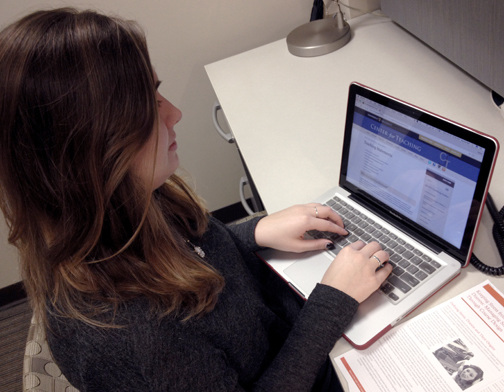Flipping the Traditional Mentoring Model
by Rachel Biel, CFT Undergraduate Intern
This past summer I had the opportunity to intern for Spectrum Health—a healthcare system in my hometown, Grand Rapids, MI. For the summer I was assigned to work with Senior Project Manager Rebecca Content, whose project was joint venture with another local hospital to provide primary care and specialty care, along with laboratory and radiology services, a urgent care center, an ambulatory surgical center, and multiple specialties.
 Facilitating the creation of the 120,000 square foot facility requires a variety of different teams including operations, construction, facilities, information services, clinical oversight, and financial oversight. The greatest complexity of this specific project, however, is coordinating the efforts of individuals from the two different organizations, as most decisions require compromise and mutual agreement. Watching the way Rebecca facilitated work groups and acknowledged the interests of both organizations was a truly a privilege.
Facilitating the creation of the 120,000 square foot facility requires a variety of different teams including operations, construction, facilities, information services, clinical oversight, and financial oversight. The greatest complexity of this specific project, however, is coordinating the efforts of individuals from the two different organizations, as most decisions require compromise and mutual agreement. Watching the way Rebecca facilitated work groups and acknowledged the interests of both organizations was a truly a privilege.
I was in awe of Rebecca. She knew everyone, or at least someone on every team, and tactfully engaged them at the appropriate time to further the project. One day, as we were walking to a meeting up the hill (that’s Spectrum Health lingo for up in the hospital) she shared with me that she had been considering applying for an adjunct position teaching introductory project management at a local university, however she was hesitant because the application required a Teaching Statement, Teaching Philosophy, and Teaching Demonstration. This seemed like the appropriate time to bring up my experience at the CFT and make her aware of the resources we have available.
We continued to talk about the many teaching guides available from writing a teaching statement to syllabus design to facilitating group work. At first I was hesitant to talk about some of these topics, as all of my classroom experience has been as a student rather than an instructor, but I realized that I knew more than I thought. When it came time for Rebecca to develop her teaching demonstration she consulted me about ways to keep the group engaged, and we brainstormed a think-pair-share activity that got the group to apply the stages of project management to a kitchen remodel project. I thought back to the different conversations I have had with CFT staff and teaching fellows about the services they provide to the Vanderbilt community and beyond. To me this was a turning point in my internship: the point where I finally felt I contributed valuable experience to my team. The one-way “Rebecca mentors Rachel” relationship turned to a mutual exchange of ideas and learning.
While I hope that I have been able to helpful to the men and women who have and continue to mentor me, this experience with Rebecca helped me realize that I also bring knowledge and experience to a mentoring relationship. Regardless of differences in age, my experiences have the potential to benefit others, just as theirs benefit me.

Leave a Response